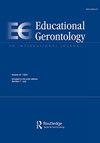Promoting self-care behavior among older adults with type 2 diabetes by the combined mindfulness and self-regulatory intervention via social media: a three-arm cluster randomized controlled trial
IF 1.5
4区 教育学
Q3 EDUCATION & EDUCATIONAL RESEARCH
引用次数: 0
Abstract
ABSTRACTDeveloping self-care behaviors is a fundamental yet challenging strategy to prevent the complications of diabetes. This three-arm randomized controlled trial aimed to compare the effectiveness of combined mindfulness and self-regulation-based intervention with self-regulation-based intervention on self-care behaviors of Iranian older adults with diabetes in 2021–2022. Three public diabetic clinics were randomly assigned to three study groups and then 45 participants were randomly recruited from every clinic. 24-week educational interventions via WhatsApp included a self-regulation-based intervention (SRIP), a combined mindfulness and self-regulation intervention (CMSRIP), and routine care with training on COVID-19 prevention were performed in two intervention groups and a control group respectively. Data were collected at baseline and four and 16 weeks using a Mindfulness-based questionnaire (MSCS) and a summary of the diabetes self-care activities scale (SDSCA). The SPSS software (V. 22) was used to analyze data through ANOVA test, chi-square tests, one-way ANOVA, Levene’s test, and Repeated measures MANCOVA at a significance level of less than 0.05. The total scores of MSCS and SDSCA in four and 16 weeks significantly increased compared to the baseline in both SRIP and CMSRIP groups (P < .001), but not in the control group. The mean scores of MSCS and SDSCA at week 4 in CMSRIP group improved significantly more than SRIP group (98.43 ± 5.83 vs. 90.31 ± 12.62 and 70.38 ± 4.18 vs. 62.35 ± 5.53). Combined mindfulness and self-regulation education are significantly effective in promoting self-care skills and improving cognitive processes and can used to improve older adults’ self-care behaviors.Trial registration numberThis trial (ISRCTN77260130) was retrospectively registered on 28/09/2021. AcknowledgementsWe are grateful to dear seniors who participated in the study, as without their support the study could not have been conducted.Disclosure statementNo potential conflict of interest was reported by the authors.Ethics approval and consent to participateThis study was approved by the Ethics Committee of Shiraz University of Medical Science (Ref. no: IR.SUMS.REC.1398.1365), which is available from: https://ethics.research.ac.ir/. The trial registration number of this study is ISRCTN77260130, which is available from: https://www.isrctn.com/ISRCTN77260130. All participants were informed that participation in the study was voluntary. Initially, verbal consent to participate in the study was obtained from the selected participants by telephone, and then a written informed consent link was sent to them via WhatsApp and signed by them. They were also assured that the data collected would remain confidential. All methods were performed in accordance with the WMA Declaration of Helsinki, ethical principles for medical research involving human subjects.Additional informationFundingThis work was supported by the Vice-Chancellor for Research, Shiraz University of Medical Sciences [no].通过社交媒体正念和自我调节相结合的干预促进老年2型糖尿病患者的自我护理行为:一项三组随机对照试验
发展自我护理行为是预防糖尿病并发症的一项基本但具有挑战性的策略。这项三组随机对照试验旨在比较2021-2022年以正念和自我调节为基础的联合干预与以自我调节为基础的干预对伊朗老年糖尿病患者自我护理行为的有效性。三家公立糖尿病诊所被随机分配到三个研究小组,然后从每个诊所随机招募45名参与者。通过WhatsApp进行为期24周的教育干预,包括基于自我调节的干预(SRIP)、正念和自我调节相结合的干预(CMSRIP),以及在两个干预组和一个对照组中分别进行常规护理和COVID-19预防培训。使用基于正念的问卷调查(MSCS)和糖尿病自我护理活动量表(SDSCA)在基线、第4周和第16周收集数据。采用SPSS软件(V. 22)对数据进行分析,采用方差分析、卡方检验、单因素方差分析、Levene检验和重复测量方差分析,显著性水平小于0.05。与基线相比,SRIP组和CMSRIP组在第4周和第16周MSCS和SDSCA总分均显著升高(P < 0.001),而对照组无显著升高。第4周时,CMSRIP组MSCS和SDSCA平均评分明显高于SRIP组(98.43±5.83比90.31±12.62,70.38±4.18比62.35±5.53)。正念与自我调节相结合的教育对提高老年人的自我照顾能力和改善认知过程有显著的效果,可以用于改善老年人的自我照顾行为。该试验(ISRCTN77260130)于2021年9月28日回顾性注册。我们非常感谢参与这项研究的前辈们,没有他们的支持,这项研究就不可能进行。披露声明作者未报告潜在的利益冲突。本研究经设拉子医科大学伦理委员会批准(参考编号:IR.SUMS.REC.1398.1365),可从https://ethics.research.ac.ir/获取。本研究的试验注册号为ISRCTN77260130,可从https://www.isrctn.com/ISRCTN77260130获取。所有参与者都被告知参与这项研究是自愿的。最初,通过电话从选定的参与者那里获得参与研究的口头同意,然后通过WhatsApp向他们发送书面知情同意链接并由他们签名。他们还得到保证,所收集的数据将保密。所有方法均按照世界医学会赫尔辛基宣言,即涉及人类受试者的医学研究的伦理原则进行。本研究得到设拉子医学科学大学研究副校长的支持[no]。
本文章由计算机程序翻译,如有差异,请以英文原文为准。
求助全文
约1分钟内获得全文
求助全文
来源期刊

Educational Gerontology
Multiple-
CiteScore
2.50
自引率
13.30%
发文量
80
期刊介绍:
This well-respected journal offers up-to-date original research in the fields of gerontology, adult education, and the social and behavioral sciences. Researchers from around the world will benefit from the exchange of ideas for both the study and practice of educational gerontology. Papers published in the journal will also serve as authoritative contributions to the growing literature in this burgeoning field. Educational Gerontology is the only international journal of its kind to publish twelve issues per volume year. Articles featuring outcome-based practical educational resources in gerontology for the educational professional, care provider, trainer, and student in such areas as: art, music, drama and recreational therapies; mental health, communication arts, social programs and policies; and, social work, nursing, physical and occupational therapies, financial planners, architecture and interior design, family relations and therapy, and religion and spirituality.
 求助内容:
求助内容: 应助结果提醒方式:
应助结果提醒方式:


